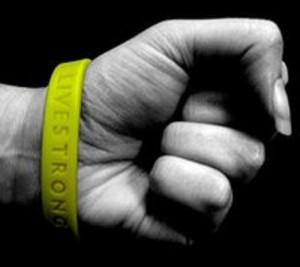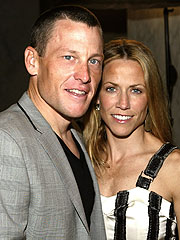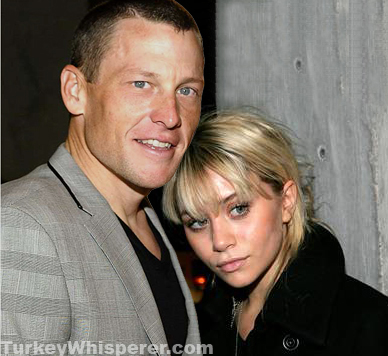
It's Not About the Bike: My Journey Back to Life by Lance Armstrong

If I didn't read it for myself, I would never have believed that Lance Armstrong could be such a cocky son of a gun. In It's Not About the Bike: My Journey Back to Life, I got a play-by-play account of cycling like I never would have otherwise. I also think that the title is totally a lie. Let's face it Lance, it is about the bike. It's about what the bike represents as well as the sport of cycling, setting goals, overcoming obstacles, and winning. It's all about that and more. Lance says that he does not believe in God (or at least not in an organized-religion sort of way, he is described as "agnostic"), yet I perceived him to be quite spiritual. Perhaps it is how he spoke about his cycling and then how he looked at his life post-cancer. He said that winning cancer was a lot more important than winning the Tour de France twice (in total, he won this 3 week long more than 3,600 kilometres (2,200 mile) race seven times post cancer.) Unlike Adam in 50/50, Lance Armstrong's testicular cancer had metastisized into his lungs and brain placing him in the worst 3% of cases seen by his oncologist.
Reading this book, I definitely got a greater appreciation for the sport of cycling but Lance began to name drop like anything and I found my head spinning. (Who was that again? Who was he?) I also learned how Lance's experience with cancer was the catalyst for developing Livestrong, the Lance Armstrong Foundation which unites, inspires and empowers people affected by cancer. I am all for an organization like this which "fights to improve the lives of people affected by cancer." This organization is an excellent example of how a vision can create a movement. The Livestrong empire hosts athletic events, fitness and leadership institutes, publishes guidebooks and resources, videos, and perhaps most famously made those yellow rubber wristbands all the trend.

He spoke so highly of his wife Kik (Kristin Richards) who stuck by him through thick and thin and did not complain. This woman sacrificed a lot for their marriage and his career including her own career and comfort. She had a huge part to play in getting Lance to cycle again after his cancer as well as starting Livestrong. So I wondered what happened between the time he wrote the book until the marriage ended three kids and four years later. But then I found this article on Oprah's site here. It looks like what Lance praised was also the downfall. Kristin was trying to be the perfect wife and the perfect mother and kept a lot of her own wishes to herself, losing herself in the process. The Lance Armstrong that was married to Kik was new to me. (I only new post-Sheryl Crow Lance Armstrong who had married other women and girlfriends. Sheryl Crow, by the way, is also a cancer survivor.) He has a history of dating celebrities. Let's take a look at his dating history. (PLEASE NOTE: This is not your typical book review and I am not your typical book reviewer. I do however have a guilty pleasure for Hollywood gossip. Humour me.)
Lance Armstrong with Kristin Richards,

Sheryl Crow,

Kate Hudson,

Anna Hansen,

and Ashley Olsen (15 years his junior).

Lance Armstrong is popular with the ladies! (He really likes blondes. I guess I have no chance.)
Okay now that I've got that out of my system, let me continue with more serious matters.
In almost 290 pages, It's Not About the Bike is a compelling read. I was hooked through most of it although I found some parts emotionally challenging to read (like the monotony and suffering during chemotherapy and the precarious nature of the Tour de France). Lance Armstrong, Texan badass on a bike, struggles and comes out a winner, displaying the human spirit's capacity to conquer all types of physical and mental obstacles. As a reader, I am better for having read this book and sharing this journey with Lance Armstrong.
One section that I most related to with Lance Armstrong on is survivorship. There was a period when Lance Armstrong talked about after he got news of his remission that lasted for over a year. During that time, he went through a "don't care" period in some respects. He spent a period of time not fully committed to or sure if he wanted to continue cycling. He played golf all day and "got fat". Was it a depression? Not sure but he certainly did not resemble the "Tour de France"-winning Lance we know. I have heard a few young adult survivors refer to this period. One said he was "lost" for about two years. Another person said he found it very difficult to do the mundane chores of life like laundry and cleaning house. For me, it is the sense of one's mortality and a huge shift of perspective. The sense that if this was the last day on Earth, what would you rather do? Chores or something a lot more fun. Judging by Lance's experience, he had a lot of people rallying to get him back on the bike but essentially they had to let him go through this period and sort some emotional stuff.
Coming Up Next: Vegan Soulfood Guide to the Galaxy by Afya Ibomu
No comments:
Post a Comment